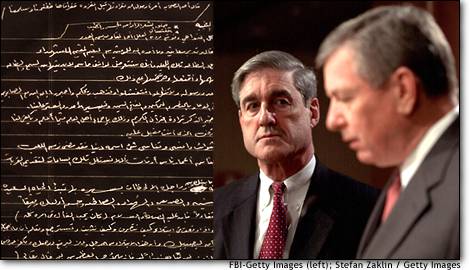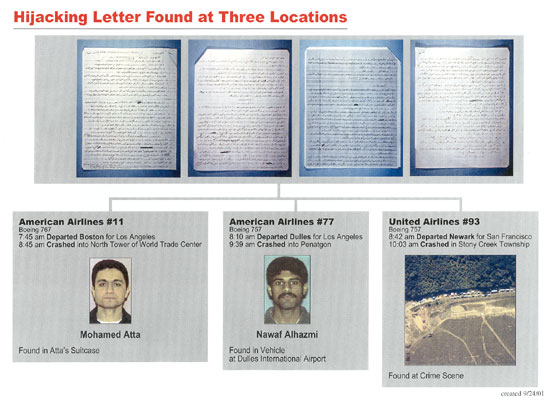
Monday, October 27, 2003  Concerned
that an untranslated letter identifying hijackers
(left) might have uncovered the September 11 plot,
Mueller and Ashcroft have put pressure on FBI
translators Lost
in Translation The
Feds listen in on terrorists every day. Too often
they can't understand a word they hear By Daniel Klaidman and Michael Isikoff
NEWSWEEK  Eric
Mueller comments: NEWSWEEK has
this
story in its
latest issue. It highlights the FBI's
ongoing translation problems, specifically
with Arabic and Farsi (Persian).
As it turns out,
the FBI creates its own problems by
setting standards of "loyalty" that only a
small minority of applicants can meet.
Well, this is the price
that the US government pays when its
leaders decide to target virtually a whole
civilization, and one of the world's
leading religions, as "terrorist."
Zionist zealot
Daniel Pipes proclaims in a recent
book: "All Muslims, unfortunately, are
suspect." (Daniel Pipes, Militant Islam
Reaches America, New York: W.W.
Norton, 2003, p. 140). Obviously, with
such an attitude one would be hard pressed
to find competent translators who would
not be "suspect." WHAT caught my eye was not the story
itself, but the relatively minor matter of
the picture on the opening page of the
story and the caption:
"Concerned that an
untranslated letter identifying hijackers
(above left) might have uncovered the
September 11 plot, Mueller and Ashcroft
have put pressure on FBI translators."
The letter shown is
actually the famed "hijacker letter," a
translation of which I did and which
is on this website.
Newsweek made it
look a little different by "cropping" a
couple inches off the right side of the
text. Compare the picture on the Newsweek
page with the original
FBI photo (bottom of this page). That
letter, as we know, doesn't mention any
of the September 11, 2001
hijackers. After reading through the
Newsweek story, I am not sure what
that caption is supposed to be referring
to. Perhaps it is a reference to a tape
of a telephone conversation that
allegedly wasn't translated until after
the fateful day and which reportedly
cryptically referred to September 11 as
"zero hour." But if so, that tape didn't
mention the hijackers either, so far as we
know.
This matter of how
Newsweek choses its graphic images and
captions is certainly a side issue when
compared to the increasingly costly
occupations of Iraq, Afghanistan, Kuwait,
and parts of Qatar, Saudi Arabia, Yemen,
the Philippines, etc.
On the other hand, it is
an example of the cavalier way in which
the media treat stories of considerable
importance where detail can be of
literally life-and-death significance.
 Arabist Eric Mueller
is this website's expert on Middle Eastern
affairs. He was a featured speaker at this
year's Real
History weekend at Cincinnati, Labor Day
2003 |
The clash of civilizations rages
in some surprising places, and one of them is the
large room in the FBI's Washington, D.C., Field
Office that houses a unit known as CI-19. In one
set of cubicles sit the foreign-born Muslims;
across a partition is everyone else.They have the same vital job: to translate
supersecret wiretaps of suspected terrorists and
spies. But the 150 or so members of CI-19 (for
Counterintelligence) segregate themselves by
ethnicity and religion. Some of the U.S.-born
translators have accused their Middle Eastern-born
counterparts of making disparaging or unpatriotic
remarks, or of making "mistranslations" -- failing
to translate comments that might reflect poorly on
their fellow Muslims, such as references to sexual
deviancy. The tensions erupt in arguments and angry
finger-pointing from time to time. "It's a good
thing the translators are not allowed to carry
guns," says Sibel Edmonds, a Farsi
translator who formerly worked in the unit. To fight the war on terror, the FBI desperately
needs translators. Every day, wiretaps and bugs
installed under the Foreign Intelligence
Surveillance Act (FISA) record hundreds of hours of
conversations conducted in Arabic or other Middle
Eastern languages like Farsi. Those conversations must all be translated into
English -- and quickly -- if investigators are to
head off budding Qaeda plots against the United
States. Today, more than two years after the 9/11
attacks, the FBI is still woefully short of
translators. FBI Director Robert Mueller has
declared that he wants a 12-hour rule: all
significant electronic intercepts of suspected
terrorist conversations must be translated within
12 hours. Asked if the bureau was living up to its own
rule, a senior FBI official quietly chuckled. He
was being mordant: he and every top gumshoe are
well aware that the consequences could be tragic.
Since 9/11, goaded by the dire warnings of Attorney
General John Ashcroft, Congress has poured billions
of dollars into the war on terror to beef up
manpower, including hiring foreign-language
translators. (CALLING ALL LINGUISTS
... TO SERVE YOUR COUNTRY, reads the latest
help-wanted ad posted on the FBI's Web site.) The bureau has made some headway: before 9/11,
the FBI had only 40 Arabic and 25 Farsi speakers to
listen to national-security intercepts. Today,
officials claim, there are 200 Arabic and 75 Farsi
speakers on the job (about two thirds are contract
employees). Still, that's not nearly enough: every week, say
informed sources, hundreds of hours of tapes from
wiretaps and bugs pile up in secure lockers,
waiting, sometimes for months on end, to be
deciphered. The bureau's slow progress is not for
lack of money. Rather, the FBI's understandable but
obsessive concern with security, its sometimes
cumbersome bureaucracy and, critics say, the
remnants of its nativist culture make it a
difficult place for Muslims and foreign-born
linguists to get jobs and work. A shortage of Arabic speakers has plagued the
entire intelligence community. Though U.S.
intelligence was using all the best technology --
spy satellites, high-tech listening posts and other
devices -- to listen in on the conversations of
possible terrorists, far too often it had no idea
what they were saying. A congressional inquiry after 9/11 found
enormous backlogs. Millions of hours of talk by
suspected terrorists -- including 35 percent of all
Arabic-language national-security wiretaps by the
FBI -- had gone untranslated and untranscribed.
Some of the overseas intercepts contained
chillingly precise warnings. On Sept. 10, 2001, the
National Security Agency picked up suggestive
comments by Qaeda operatives, including
"Tomorrow is zero hour." The tape of the
conversation was not translated until after
9/11. The FBI is still overwhelmed. Because of a
threefold increase in FISA wiretaps to monitor the
terror threat, the bureau has struggled to keep up.
Mueller has been adamant about trying to monitor
conversations -- in real time -- in the dozen or so
truly urgent terrorism investigations. But he has
been disappointed again and again. One FBI official described an oft-repeated
awkward scene in the director's office: a top
investigator comes to brief Mueller on a
high-priority case, the kind that appears in the
Threat Matrix shown to President George W.
Bush every morning. During the course of the
presentation, it becomes obvious that there are
significant gaps in the case. The sheepish agent finally admits that hours of
wiretaps have yet to be translated. Mueller, a
no-nonsense ex-Marine, swallows his exasperation
and tersely instructs his subordinates to "do
better." In theory, there are rules for prioritizing
which conversations are to be translated first. Can
the information be obtained elsewhere? Is the
speaker a known Qaeda member? Is there other
intelligence suggesting urgency? In practice, says
one street agent, "it all depends on how loud you
scream on the phone to headquarters." Agents who live in fear of missing the smoking
gun that might prevent a catastrophic terror attack
are at a loss to explain the bureau's inability to
fix the problem. "We keep getting these signals
that they need a full-court press and no stone
unturned," says one agent. "But the jewels might be
on a diskette in a secure locker in Washington. It
keeps some of us awake at night." G-men tell horror stories of blown
opportunities, like the one about a Qaeda suspect
whose phone was tapped right up to the moment he
left the United States. Only after he had surfaced
in Yemen did the translators in CI-19 get around to
listening to a CD-ROM of his conversations sent to
a field office. The suspect had been talking about
leaving the country for some time. (FBI officials
declined to comment on the matter, except to say
that the facts are more complicated than the story
suggests, and to note that without evidence of a
crime the suspect could not have been detained
anyway.) The grumbles of street agents are not just the
usual grousing about the "suits" back at Washington
headquarters. In the weeks before the Iraq war,
Newsweek has learned, agents in a field
office on the Eastern Seaboard of the United States
were closely watching a radical imam with
disturbing ties to Qaeda elements in northern Iraq.
The FBI feared that the imam might try to launch a
terror attack in the United States in retaliation
for a U.S. invasion of Iraq. Agents put the imam under round-the-clock
surveillance. But, lacking a translator who could
listen to his conversations in real time, the
agents loaded FedEx boxes with CD-ROMs and sent
them to Washington to be translated. The recordings
languished there for weeks and even months before
transcripts were made. Desperate for faster action, the FBI field
office hired a translator -- but had to settle for
one who had trouble understanding the imam's
particular dialect. Arabist Eric Mueller is this website's expert
on Middle Eastern affairs. He was a featured
speaker at the Real
History weekend at Cincinnati, August 29-September
3, 2003. 
  David
Irving: Radical's Diary, October 1,
2001
David
Irving: Radical's Diary, October 1,
2001 Article
by Robert Fisk on the letter, in The
Independent
Article
by Robert Fisk on the letter, in The
Independent Translation
of letter
Translation
of letter-
    
|
 The above item
is reproduced without editing other than
typographical
The above item
is reproduced without editing other than
typographical The above item
is reproduced without editing other than
typographical
The above item
is reproduced without editing other than
typographical